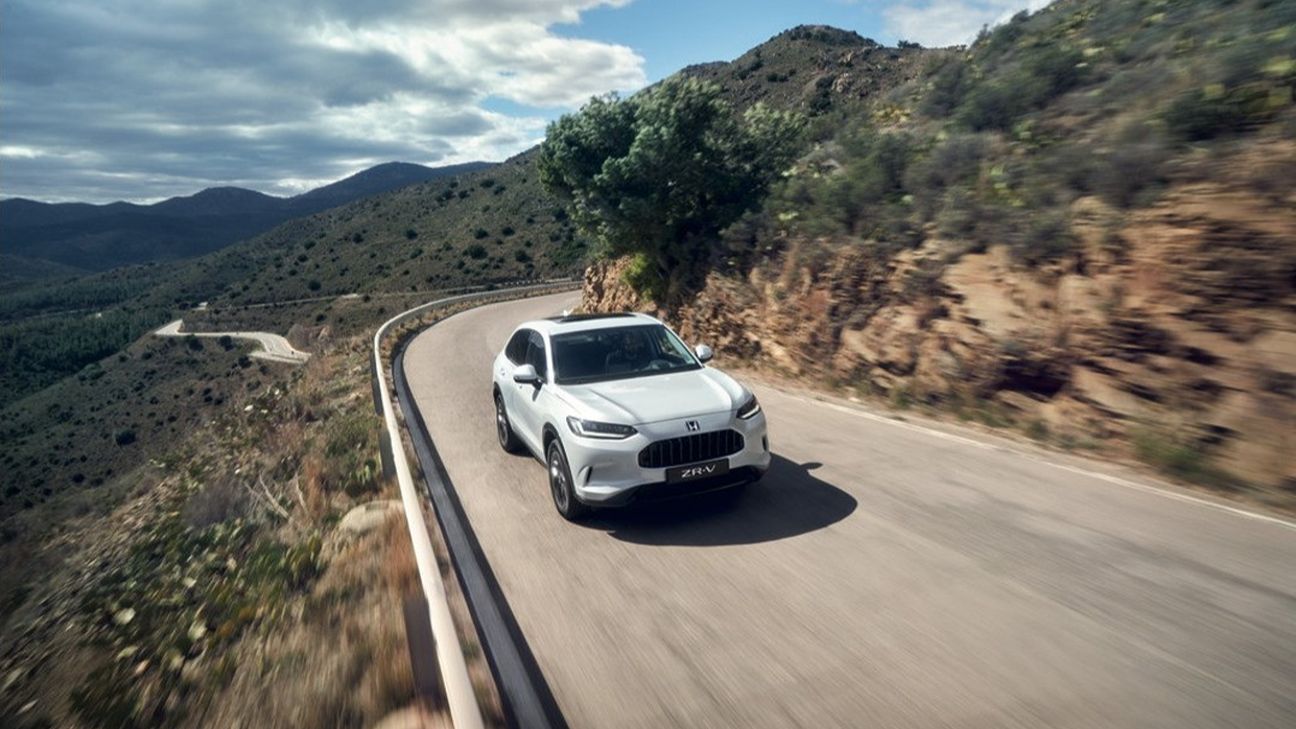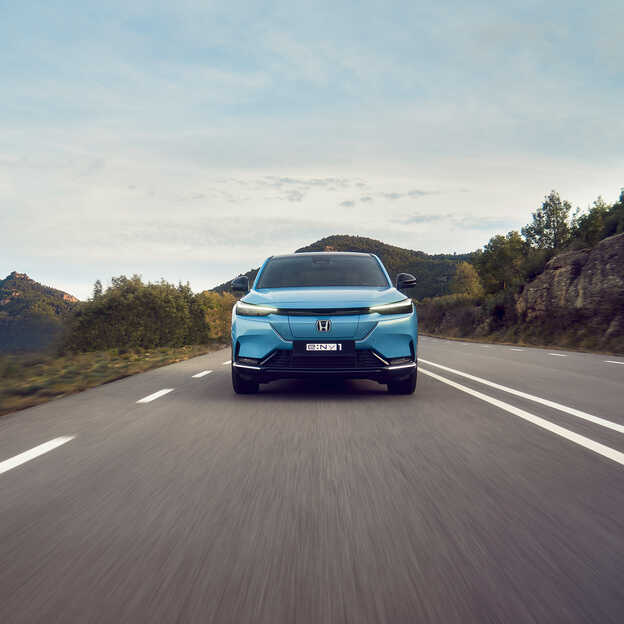Not sure about the difference between hybrid and electric cars? Now is a great time to find out. Across Europe, new regulations are shaping the future of driving, with many countries planning to phase out new petrol and diesel car sales by 2035. (PDF, 590KB)
The transition to electrified driving is well underway - but which is right for you, hybrid or electric? Our hybrid vs electric car comparison should help you decide.
What is the main difference between hybrid and electric cars?
The key difference between hybrid and electric vehicles is the way they’re powered. A hybrid vehicle is more like a traditional car. It uses a conventional engine in addition to electrical power. An electric car, known as an EV, is different. It doesn’t have a conventional engine. Instead, it is powered solely by electricity.
Hybrid cars
Hybrids are the middle ground between fully electric and regular cars. They’re powered by a traditional engine, called a combustion engine, and an electric motor and battery. These can work together or independently. Though plug-in hybrids have an external battery, you can plug in to charge at any EV charge point.
Full hybrids use petrol or diesel for fuel, mainly, but can also run solely on their electric battery:
- A mild hybrid cannot be driven on electric power alone.
- A full hybrid can drive short distances on electric power alone.
- A plug-in hybrid can drive on average 298 miles on electric alone.
Electric cars
Electric vehicles (EVs) work differently from petrol or diesel cars. Instead of an engine, they run on an electric motor powered by a battery. That means no more trips to the petrol station—simply charge at home or at a public charging point.
With zero tailpipe emissions, EVs offer a cleaner way to drive. The European Union is investing in electric mobility, introducing incentives and expanding charging infrastructure across member states. By 2025, new regulations will require fast-charging stations every 60 km along major roads.
With improved battery ranges, more charging points, and growing support across Europe, electric cars are becoming a practical choice for everyday driving.
Not sure about the difference between hybrid and electric cars? Now is a great time to find out. Across the UK and Europe, new regulations are shaping the future of driving, with many countries planning to phase out new petrol and diesel car sales by 2035. (PDF, 590KB)
The transition to electrified driving is well underway - but which is right for you, hybrid or electric? Our hybrid vs electric car comparison should help you decide.
Hybrid vs electric cars both have their pros and cons
Hybrid advantages
Better fuel efficiency
As hybrid cars use both a combustion engine and an electric motor, the engine uses less fuel compared to a traditional car. The HR-V hybrid can travel up to 454 miles on a full tank*.
*HR-V WLTP data
Flexibility for long-distance travel
When your electric battery reaches the end of its charge, the vehicle will seamlessly switch to the engine. You can travel short distances using only electric power – plug-in hybrids go furthest.
Less wear-and-tear
Hybrids use electric power at lower speeds, so there’s less wear and tear on the engine. This means they require less maintenance than conventional cars.
Electric advantages
Zero emissions boost air quality
Electric vehicles produce zero tailpipe emissions, which can reduce air pollution in urban areas. Many countries offer tax benefits, congestion charge exemptions, and lower road tax for EV drivers—offering potential savings and advantages for city journeys.
Lower running and maintenance costs
Charging an EV at home in the EU typically costs between £8-25 for a full charge, which translates to roughly £3-7 per 100 miles, depending on your tariff. In the UK, running an EV is generally cheaper than a petrol or diesel car, though the exact savings depend on electricity tariffs and driving habits.
With fewer mechanical parts - no oil changes, no clutch, and less brake wear - EVs also enjoy lower maintenance bills. As battery prices continue to drop and ownership incentives remain in place, the total cost of owning an electric vehicle in many EU countries is nearing parity with, or even undercutting, petrol and diesel models.
Source: The cost of charging an electric car across Europe.
Cheap and plentiful charging
As of mid-2024, the UK had over 60,000 public charging points, with this number continuing to grow.
Charging an EV at home is often more economical than refuelling a petrol or diesel vehicle, leading to significant savings for EV owners.
Longer range for most journeys
In 2023, newly registered battery electric vehicles (BEVs) in the UK had an average range of 267 miles on a single charge.
With the continuous expansion of charging networks and improvements in EV technology, electric vehicles are becoming an increasingly practical choice for drivers in the UK.
How do electric car vs hybrid costs compare?
Initial Purchase Price
Electric cars have a higher initial purchase price than hybrid vehicles or petrol/diesel cars. For example, a Hybrid Honda Jazz starts at around £30,000, while a fully electric Honda e:Ny1 starts at £48,000. Plug-in hybrids have a higher price than full hybrids. For example, the CR-V e:PHEV Plug-in hybrid costs upwards of £60,000.
(Prices based on January 2025 data. For the latest pricing, visit Honda’s official website.)


Resale Value
The second-hand market for electric cars in the UK is growing rapidly, giving EV and hybrid buyers more options and better value. Meanwhile, for new car registrations in 2024, BEVs accounted for 19.6% of the UK market. This rise in new vehicle sales is helping strengthen the resale market, bringing more used EVs and hybrids into circulation.
Because more used EVs are coming onto the market, buyers have more choice—and price competition is improving value for buyers. On the flip side, as supply increases, some models are seeing faster depreciation, especially those with smaller batteries or shorter ranges. Battery warranty coverage and condition play an important role in preserving resale value.

Should I buy a hybrid or electric car?
When considering hybrid vs electric and which is better for you, it’s at the end of the day a personal choice. If you want to learn more about hybrids and electric vehicles, check out our blog.
Related reading
Honda Hybrid Range Overview
12.08.25
Dispelling 10 common EV myths

15.04.25
Honda 0 series
.jpg/_jcr_content/renditions/c2_r.jpg)
07.10.24
Are all electric cars automatic?

23.09.24
Honda e:PROGRESS

25.03.24
Electric Car Charging in Europe Guide

20.03.24
How An Electric Car Can Save You Money (As well as the environment)

